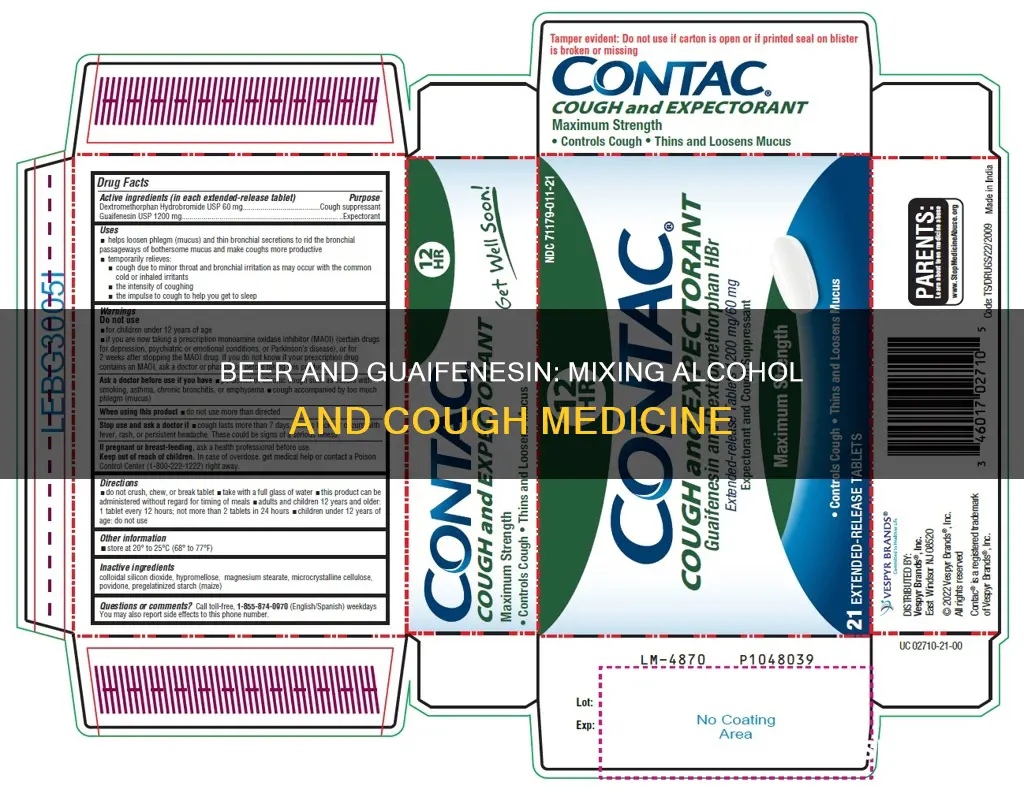
Drinking alcohol while taking medication can be dangerous, as alcohol can interfere with the medication's effectiveness and make its side effects worse. One medication that people may wonder about is guaifenesin, an over-the-counter drug that relieves chest and sinus congestion by loosening mucus in the lungs. Although guaifenesin itself does not directly interact with alcohol, it is still not recommended to mix the two. This is because alcohol can worsen symptoms of illness and weaken the immune system, making it harder to recover. Additionally, when guaifenesin is combined with other substances such as dextromethorphan or acetaminophen, drinking alcohol can lead to dangerous side effects such as liver damage, rapid heart rate, and an increased risk of overdose. Therefore, it is generally advised to avoid drinking alcohol while taking guaifenesin, especially if it is part of a combination medication.
| Characteristics | Values |
|---|---|
| Is it safe to mix Mucinex/Guaifenesin and alcohol? | Doctors generally consider it unsafe. |
| What are the side effects of mixing Mucinex/Guaifenesin and alcohol? | Increased risk of overdose, rapid heart rate, liver damage, heightened Mucinex side effects, increased intoxication, respiratory depression, brain lesions, etc. |
| What are the side effects of drinking alcohol while sick? | Worsened symptoms, dehydration, weakened immune system. |
| What are the side effects of mixing Mucinex DM and alcohol? | Severe side effects such as hot flashes, hypertension, anxiety, panic attacks, seizures, liver damage, neurological damage, respiratory problems, etc. |
| What are the side effects of mixing alcohol with acetaminophen? | Increased risk of unwanted side effects and complications, severe liver damage. |
What You'll Learn

Mixing beer with Mucinex DM may increase the risk of overdose
Mixing beer, or any alcoholic drink, with Mucinex DM is not advised, as it may increase the risk of overdose. Mucinex is an over-the-counter (OTC) brand that contains the active drug guaifenesin, which helps to relieve chest and sinus congestion by loosening mucus in the lungs. Mucinex DM contains the additional ingredient dextromethorphan (DXM), a cough suppressant. Both alcohol and DXM are central nervous system (CNS) depressants, which means they can cause relaxation, sleepiness, and a euphoric feeling.
Mixing alcohol and Mucinex DM can lead to additive central nervous system depression and/or impairment of judgment, thinking, and psychomotor skills. This combination may also cause severe side effects, including hot flashes, hypertension, anxiety, panic attacks, and potentially fatal seizures. The overuse of Mucinex DM with alcohol may also cause long-term effects such as liver damage, neurological damage, respiratory problems, and tolerance or dependence on both DXM and alcohol.
In addition, alcohol can worsen the symptoms of congestion and weaken the immune system, making it harder to recover from illness. Alcohol can also cause dehydration, which can further compromise the immune system. Therefore, it is generally recommended to avoid alcohol while taking Mucinex DM to prevent any potential health risks.
While guaifenesin itself does not present a major health risk when mixed with alcohol, the combination of Mucinex DM and alcohol can be dangerous. It is important to read the labels of any medications and avoid mixing them with alcohol unless advised otherwise by a healthcare professional.
Antabuse and Alcohol: Why Drinking Beer is Risky
You may want to see also

Beer and Mucinex can cause unwanted side effects like dizziness and drowsiness
Mucinex is a medication that contains guaifenesin, an expectorant that helps to relieve chest and sinus congestion by loosening mucus in the lungs. It is generally considered safe for most people, but it can interact with other substances, including alcohol.
While drinking a limited quantity of alcohol with Mucinex may not be dangerous, it is not recommended. Mixing the two can cause unwanted side effects, including increased intoxication, dizziness, drowsiness, impaired coordination, and a rapid heart rate.
Both Mucinex and alcohol can cause drowsiness, and taking them together can amplify this effect. This increased drowsiness, along with dizziness, can lead to injuries from tripping or falling. The combination may also cause liver damage and an increased risk of overdose.
Additionally, Mucinex may contain other active ingredients, such as dextromethorphan (DXM), a cough suppressant, and acetaminophen, a pain reliever. Mixing alcohol with these ingredients can be very dangerous and even life-threatening.
Therefore, it is generally safest to avoid consuming alcohol while taking Mucinex to prevent any unwanted side effects.
Drinking Beer While on Dbol: What You Need to Know
You may want to see also

Alcohol may worsen symptoms of illness
While it is not a major health risk to mix guaifenesin and alcohol, drinking alcohol while you are unwell is generally not advised. Alcohol can worsen symptoms of illness and weaken the immune system, making it harder for your body to recover.
Alcohol is a central nervous system depressant, slowing down your coordination and judgement. It can also irritate the gastrointestinal tract, causing nausea and dizziness. Drinking alcohol while taking medication can increase the risk of side effects and adverse health effects.
If you are taking guaifenesin for congestion, alcohol can worsen these symptoms. Congestion is often a symptom of an infection, and alcohol suppresses the immune system, making it harder for your body to fight off illness or infection. Alcohol can also cause dehydration, which can be dangerous when you are unwell.
Drinking alcohol while taking medication can also be dangerous because the two can interact in different ways. Alcohol can make medication less effective, more toxic, or intensify side effects. It can also cause new symptoms and make you feel more intoxicated.
If you are taking Mucinex, which contains guaifenesin, it is best to avoid alcohol. Mucinex may also contain the active ingredients acetaminophen and dextromethorphan, which can be dangerous when mixed with alcohol. Dextromethorphan is a central nervous system depressant, and mixing it with alcohol can cause additive central nervous system depression and/or impairment of judgement, thinking, and psychomotor skills.
Beer and Painkillers: How Does Ibu Work?
You may want to see also

Mixing beer with Mucinex may cause liver damage
Mixing beer, or any alcoholic drink, with Mucinex is generally considered unsafe and is not advised by doctors. Mucinex is a medication that contains guaifenesin, an expectorant that helps to relieve chest and sinus congestion by loosening mucus in the lungs. While guaifenesin does not directly interact with alcohol, Mucinex may also contain other active ingredients, such as acetaminophen and dextromethorphan (DXM), that can cause dangerous side effects when mixed with alcohol.
Alcohol is a central nervous system depressant that can slow a person's breathing, cause dizziness, and affect their balance and coordination. It can also irritate the gastrointestinal tract, heightening the symptoms associated with Mucinex. Mixing alcohol with Mucinex can lead to increased intoxication, as the side effects of Mucinex can amplify the intoxicating effects of alcohol, such as drowsiness and dizziness. This increased intoxication can lead to injuries from tripping or falling.
More seriously, mixing alcohol with Mucinex can cause rapid heart rate and liver damage. This is because Mucinex is metabolized in the liver, and the combination of alcohol and Mucinex can increase the risk of liver damage. Additionally, the combination of alcohol with DXM, which is found in some Mucinex combination brand products, can be very dangerous and even life-threatening. Both alcohol and DXM are central nervous system depressants, and taking them together may enhance their depressant actions, causing severe side effects such as hot flashes, hypertension, anxiety, panic attacks, and potentially fatal seizures.
Therefore, it is best to avoid mixing beer or any alcoholic drink with Mucinex to prevent any unwanted side effects and potential health risks, such as liver damage.
Honey's Magic in Beer: The Science Behind It
You may want to see also

Drinking beer with Mucinex may lead to an increased heart rate
Mucinex is an over-the-counter medication that helps to relieve chest and sinus congestion and coughs by loosening mucus in the lungs. It contains the active drug guaifenesin, which belongs to the expectorant drug class. While Mucinex does not directly interact with alcohol, drinking beer with Mucinex may still lead to adverse health effects.
Alcohol is a depressant that can slow a person's breathing, cause dizziness, and affect their balance. It can also interfere with other medications, including Mucinex. Mixing alcohol and Mucinex can cause unwanted side effects and doctors generally consider it unsafe.
In addition, acetaminophen is an over-the-counter medication that can relieve mild to moderate pain. Manufacturers sometimes combine it with other medications for the treatment of colds, flu, and other viral infections. Mixing alcohol with acetaminophen could cause severe liver damage. Alcohol affects the enzymes that process acetaminophen, which makes the liver more vulnerable to damage.
Therefore, it is generally not safe to mix Mucinex and alcohol, including beer. The safest option is to avoid alcohol entirely while taking Mucinex.
Celiac Disease and Beer: What's Safe to Drink?
You may want to see also
Frequently asked questions
It is not advised to mix guaifenesin with alcohol. While guaifenesin does not directly interact with alcohol, drinking while sick can worsen symptoms, cause dehydration, and weaken the immune system.
Mixing alcohol with guaifenesin can lead to increased intoxication, with side effects such as dizziness, drowsiness, impaired coordination, and gastrointestinal issues.
Guaifenesin is a drug that helps to loosen mucus in the lungs so that it can be coughed up more easily. It is often sold under the brand name Mucinex.
It is generally considered unsafe to mix Mucinex and alcohol. This is because Mucinex may contain other active ingredients such as dextromethorphan and acetaminophen, which can have dangerous interactions with alcohol.
Mixing alcohol with Mucinex can cause side effects such as rapid heart rate, liver damage, and an increased risk of overdose.







